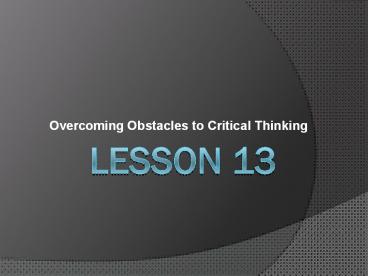Lesson 13 - PowerPoint PPT Presentation
Title:
Lesson 13
Description:
Lesson 13 – PowerPoint PPT presentation
Number of Views:213
Title: Lesson 13
1
Lesson 13
- Overcoming Obstacles to Critical Thinking
2
Group Think
- Faulty decision-making in a group.
- Groups experiencing groupthink do not consider
all alternatives and they desire unanimity at the
expense of quality decisions. - We are not thinking for ourselves instead we
allow the group to think for us.
3
Group Think
- Comes from our desire to be liked/respected by
those we surround ourselves with. - Learn to identify the times when we are more
likely to fall to groupthink and develop
strategies for overcoming group think.
4
Refusing to Listen
- Learn to listen to those you dont like.
- Growth as a critical thinker demands it.
- Refusing an idea because we dont like the person
who offered it is an example of very poor
reasoning.
5
Impatience
- We live in a right now society.
- People rarely take time to think things through.
- Critical thinking takes time.
- Our conclusions should only be made after we have
carefully reasoned through the options.
6
Fallacies
- Keep in mind the danger of fallacies.
- Examples of fallacies
- Ad Hominem
- Slippery Slope
- Perfect Solution
- Ad Populum
- Strawman
7
Perfect World
- Because we often wish that certain conclusions
are always true, we may reasons as if they are
always true, despite strong evidence to the
contrary. - We wish for a comfortable, fair world that does
not exist. - Belief in a perfect world can cause us to not
consider the dangers of daily life.
8
Stereotypes
- A stereotype occurs when we allege that a
particular groups has a specific set of
characteristics. - If we believe stereotypes, we will not approach
people and their ideas with the spirit of
openness that is necessary from strong-sense
critical thinking. - Also, we will have an immediate bias toward any
issue or controversy in which these people are
involved. The stereotypes will have loaded the
issue in advance, prior to reasoning.
9
Stereotypes
- Why do we use stereotypes?
- They save time.
- They are easy and require very little reasoning.
- Bias.
- As critical thinkers, we should be curious and
open. We should seek new information and judge
the information only on its reasoning.
10
Simplification
- Decisions and situations with simple answers
allow us to move on rapidly and confidently to
the next topic or life event. - We naturally like dichotomous thinking because it
is simple. - Dichotomous thinking seeks to avoid careful
reasoning and jump to the simplest conclusion
available.
11
Simplification
- While it is unrealistic to think we can consider
all possible alternatives, hypotheses, or
conclusions, we should resist the urge for
simplification and dichotomous thinking. - We should learn to look deeper into an issue
before making a conclusion.
12
Bias for Personal Beliefs
- Most of us believe that our personal beliefs will
hold up under tough scrutiny. - We are biased from the start of an exchange in
favor of our current opinions and conclusions. - Most of us are too confident in our own
competence. - We must remember that we are biased and that some
of our personal beliefs may very well be based on
poor reasoning. - We should never permit ourselves to be so sure of
anything that we stop searching for an improved
version (better reasoning).
13
Availability Heuristic
- Our tendency to rely on information and memories
that are easily retrieved as a basis for our
decision and judgments. - The weight attached to a particular piece of
evidence therefore depends more on its
availability than its appropriateness as a
reason. - Recent events/experiences have a tendency to
disproportionally bias our thinking.
14
Availability Heuristic
- Avoid this by asking
- Is it typical?
- Is the experience we are relying on typical or is
it just the most recent or the most vivid example
in our brains?
15
Wishful Thinking
- We are loyal to an idea when we prefer the
concepts or facts we wish were true, rather than
concepts or facts we know to be true. - The best way to avoid wishful thinking is to
practice the critical thinking skills you have
learned in this class.
16
(No Transcript)































